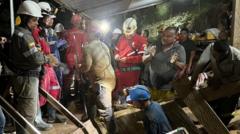Lovell's journey from a young boy aspiring to be a rocket scientist to becoming a symbol of hope during a space crisis resonates with many.
Jim Lovell, Legendary Apollo 13 Astronaut, Passes Away at 97

Jim Lovell, Legendary Apollo 13 Astronaut, Passes Away at 97
Nasa honors Lovell's pivotal role in space exploration as he passes, leaving behind a legacy of courage and determination.
Jim Lovell, the astronaut renowned for his leadership during the Apollo 13 mission, has died at the age of 97. Nasa remarked that he "turned a potential tragedy into a success," as Lovell and his crew deftly navigated a critical failure—an oxygen tank explosion—forcing them to abandon their lunar landing ambitions. The world watched with bated breath as they successfully returned to Earth, their splashdown in the Pacific becoming an iconic moment in space history.
Lovell was also a crew member on the historic Apollo 8 mission, famously known as the first to circle the Moon. Acting head of Nasa, Sean Duffy, noted Lovell's crucial contributions to paving the way for advancements in space exploration. In a heartfelt statement, Lovell's family shared, "His unshakeable optimism and humor will be deeply missed. He truly was one of a kind."
Born on March 25, 1928, in Milwaukee, Wisconsin, Lovell took his initial steps toward becoming a trailblazer in aerospace when, at the age of 16, he built a makeshift rocket. A Navy veteran, he completed his education with the military's financial support. Despite facing early setbacks, Lovell's determination led him to join Nasa's astronaut program in the early 1960s.
His journey into space began with the Gemini missions, and he soon commanded Apollo 8, becoming part of a groundbreaking mission that illuminated the fragility of Earth as they captured the iconic “Earthrise” image. This moment was a unifying experience, as people globally viewed our planet from a new perspective amid civil unrest and conflict.
On April 11, 1970, Apollo 13 launched with Lovell, Jack Swigert, and Fred Haise on board. Unexpectedly, a severe malfunction during the flight led to Lovell's now-famous line, "Houston, we've had a problem." The crew faced unimaginable odds, reliant on their training and ingenuity, to restore life support and navigation systems in their lunar module.
As the world anxiously awaited their fate, the astronauts battled freezing temperatures and dwindling supplies before successfully navigating back to the Earth's atmosphere. After a tense re-entry, they safely splashed down, marking Apollo 13 as a story of survival against the odds.
Following his retirement from the Navy in 1973, Lovell continued to share his experiences through writing and public speaking, notably through his memoir, which inspired the beloved 1995 film "Apollo 13." Lovell’s legacy endures not only through his remarkable life but also through the spirit of exploration and perseverance he embodied throughout his journey.
Lovell was also a crew member on the historic Apollo 8 mission, famously known as the first to circle the Moon. Acting head of Nasa, Sean Duffy, noted Lovell's crucial contributions to paving the way for advancements in space exploration. In a heartfelt statement, Lovell's family shared, "His unshakeable optimism and humor will be deeply missed. He truly was one of a kind."
Born on March 25, 1928, in Milwaukee, Wisconsin, Lovell took his initial steps toward becoming a trailblazer in aerospace when, at the age of 16, he built a makeshift rocket. A Navy veteran, he completed his education with the military's financial support. Despite facing early setbacks, Lovell's determination led him to join Nasa's astronaut program in the early 1960s.
His journey into space began with the Gemini missions, and he soon commanded Apollo 8, becoming part of a groundbreaking mission that illuminated the fragility of Earth as they captured the iconic “Earthrise” image. This moment was a unifying experience, as people globally viewed our planet from a new perspective amid civil unrest and conflict.
On April 11, 1970, Apollo 13 launched with Lovell, Jack Swigert, and Fred Haise on board. Unexpectedly, a severe malfunction during the flight led to Lovell's now-famous line, "Houston, we've had a problem." The crew faced unimaginable odds, reliant on their training and ingenuity, to restore life support and navigation systems in their lunar module.
As the world anxiously awaited their fate, the astronauts battled freezing temperatures and dwindling supplies before successfully navigating back to the Earth's atmosphere. After a tense re-entry, they safely splashed down, marking Apollo 13 as a story of survival against the odds.
Following his retirement from the Navy in 1973, Lovell continued to share his experiences through writing and public speaking, notably through his memoir, which inspired the beloved 1995 film "Apollo 13." Lovell’s legacy endures not only through his remarkable life but also through the spirit of exploration and perseverance he embodied throughout his journey.

















